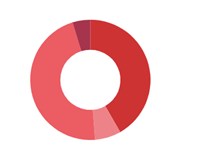
The expert election* 2024 observation mission was organized by the Belarusian Helsinki Committee and the Viasna Human Rights Center as part of the "Human Rights Defenders for Free Elections" campaign. The mission collects and analyzes information about the election campaign based on open sources and messages from voters from Belarus. You can find the analytical report on the formation of precinct commissions here.
CONCLUSIONS
- On January 25, 2024, the formation of precinct election commissions (PEC) ended. PEC are an important subject of the electoral process: they directly organize and conduct voting and vote counting. Because parliamentary and local elections* will happen at the same time, integrated PEC will be used for both campaigns;
- A total of 5,411 PEC were formed (374 fewer than in the last parliamentary elections and 459 fewer than in the last local elections). They included 57,233 persons. A reduction in the number of PEC and their membership when the workload increases (a single voting day for parliamentary and local elections*) may indicate confidence in the administrative control of all processes, as well as low political activity of voters and low turnout (against the background of population outflow), and the desire of the authorities to include exclusively loyal people in the commissions;
- The formation of PEC (as well as other stages of the elections*2024) takes place without independent observation, therefore, the procedural aspects of the PEC formation remain outside of public control. For example, there is no information about attempts to access the documents on nomination to the PEC (minutes of meetings of relevant structures of political parties, public associations, labor collectives, citizens' statements); there is no information about how the process of discussion and voting on candidates for the PEC took place;
- The range of subjects that nominated their representatives to the PEC is sharply limited (as a result of ongoing repression, the number of public associations has dropped dramatically; after re-registration, only 4 pro-government political parties remained out of 16);
- Representatives of 4 political parties received 4,763 (8.3%) seats in the PEC. Representatives of the largest pro-government public associations, which have a legislatively established special relations with the state since 2023, received 27,880 (48.7%) places;
- As in the case of territorial and district commissions, a gender imbalance persists: the share of women (74.7%) in the PEC significantly exceeds the share of men (25.3%);
- The updated legislation makes it possible not to publish the information about individual PEC members, which makes it much more difficult to assess the composition of PEC, in particular, the extent to which the commonly noted "occupational principle" of forming election commissions is preserved, when commission members represent the same organization and the workers' immediate superiors are the chairpersons of these election commissions;
- An almost complete lack of information about the stage of formation of the PEC and the rights and opportunities associated with it, addressed to a wide range of voters, shows the complete disinterest of the authorities in the real participation of citizens in the electoral processes and confirms the course towards absolute control by the authorities over all stages of the elections*2024.
The term "elections*" in relation to the 2024 election campaign is used with an asterisk by the "Human Rights Defenders for Free Elections" campaign to emphasize the perfunctory nature of this term, since any free and fair election campaign presupposes, first of all, conditions where rights and freedoms are fully realized, including freedom of speech, freedom of peaceful assembly and association, the right to take part in the conduct of public affairs, freedom from discrimination, which is currently practically absent in Belarus.




